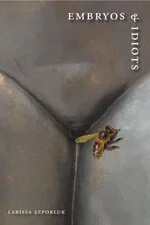About the Author
Larissa Szporluk was raised in Ann Arbor, Michigan and received her BA from the University of Michigan. She studied at the Iowa Writers’ Workshop and received an MA in Literature at the University of California Berkeley, and an MFA from the University of Virginia where she was a Henry Hoyns fellow. She began her full-time teaching career at Bowling Green State University in 2000 and has since become an associate professor of Creative Writing and Literature. In 2005, she was a visiting professor at Cornell University.
She is the author of three previous books of poetry: Dark Sky Question, winner of the Barnard Poetry Prize (Beacon Press 1998), Isolato, winner of the Iowa Poetry Prize (University of Iowa, 2000), and The Wind, Master Cherry, The Wind (Alice James Books, 2003). Her work is included in Best American Poetry 1991 and 2001, New American Voices, and numerous other anthologies. In 2003, she received a National Endowment for the Arts grant to work on Embryos and Idiots.
Advanced Praise
“In a world at war over fossilized myths, nothing is more urgent than that our myths be rewritten. Larissa Szporluk’s Embryos and Idiots revitalizes the myth of the fall, fulfilling the lineage of Genesis and Paradise Lost. Her Anoton continues the contemporary lyric legacy of Ted Hughes’s Crow, her gardens of Od that of Louise Glück’s The Wild Iris. More personal than poems that proclaim themselves so, Szporluk’s mythic lyrics also make themselves more public than most poems manage, calling down “Shame on the zealous / and jealous. Shame on the half-fish god / who dined on himself and survived.” —H. L. Hix
“The richness of language in this collection cannot be overstated-Szporluk loves to rake words, to break rocks, to turn the earth in each poem by breaking up the musty and the comfortable. In doing this she brings us new worlds, neat and prettily shaped on the page, but also smart, allusive and self referential.” –Cate Whetzel
The summer ’08 edition of the Indiana Review contains an excellent review of Larissa Szporluk’s Embryos & Idiots. Part of Cate Whetzel’s review reads thus:
The richness of language in this collection cannot be overstated—Szporluk loves to rake words, to break rocks, to turn the earth in each poem by breaking up the musty and the comfortable. In doing this she brings us new worlds, neat and prettily shaped on the page, but also smart, allusive and self referential.
The story of Anoton [which begins the book] vanishes near the end, and the book becomes simply a collection of (striking) lyrics; until then, his legend, such as it is, provides a thread to connect, and an excuse to elaborate on, Szporluk’s supremely quotable conceits, her images and aphorisms about creation myths and procreation, babies and language, planets and bodies and love, in which “The newborn’s a reborn; every // beloved is the same.” —Publishers’ Weekly
Format: Paperback
ISBN: 978-1-932195-52-1

